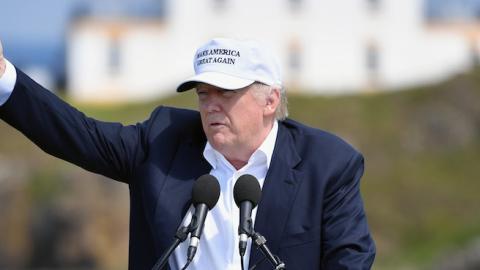At times it is better to be lucky than good. And yesterday Donald Trump was lucky indeed to find himself in the UK for the re-opening of one of his hotel/golf courses, on what the tabloid Sun calls Britain's "Independence Day". Trump is not alone in believing that Britain's decision to leave the European Union, the so-called Brexit vote, suggests that he has correctly identified the issues that are troubling voters, not only in the UK but in the U.S.
From the early days of his campaign for the presidency Trump has been calling for America to regain control of its borders. He wants to ban immigration by Muslims until a vetting process is established, and end the flow of Mexicans and others illegally entering the US. A similar desire to regain control of immigration policy was one of the drivers of the Leave vote in Britain, a country required by its membership in the European Union to admit any citizen of an EU country, allow him to work and to receive the same benefits as British citizens. Prime Minister Cameron had promised to reduce immigration to the tens of thousands: In fact, 300,000 immigrants came to Britain last year. And who-knows-how-many Syrian and other Middle Eastern and African immigrants might arrive legally once they have EU papers, and illegally if people smugglers ferry them across the channel.
Trump also has been attacking a remote, dysfunctional "elite" that cares little for voters buffeted by globalization. The Leave vote was swelled by British citizens who have a similar view of the EU—a remote, regulation-mad, self-serving bureaucracy that has contempt for "ordinary people" and squanders their tax money on the high life.
Never one to miss an opportunity for free coverage by the media, Trump was quick to take to television to claim that the Brexit vote proves that he has identified the issues that will drive Americans to the polls in November. Whether we indeed have so much in common with voters in the mother country will be tested on the campaign trail here in coming months.
The decision to leave the EU might also turn out to be good news for Federal Reserve Board chair Janet Yellen, who has been having difficulty deciding just what to do about interest rates. Once her chores in this transition period are concluded and the international and domestic financial systems are stabilized, she can look forward to a quiet summer. There is no longer any prospect that the Fed will raise rates this year, or even in 2017. Brexit has driven the British pound down and the dollar up against not only sterling but other currencies. A rising dollar will make life difficult for exporters and for American multinationals when they convert overseas earnings, received in foreign currencies, to expensive dollars. An increase in interest rates would drive the greenback up further, something Yellen does not care to do.
In addition to knowing what is happening—it is difficult to avoid minute-by-minute reports on the gyration of share prices—it is important to keep in mind what is not happening. Nothing has happened to weaken NATO, in which Britain remains one of the three members (U.S., UK, France) that can contribute significant military muscle to the alliance. Nothing, other than the decline in the pound, has happened to cause an interruption in our trade with Britain, President Obama's threat to put an independent UK at the back of the trade queue, if one such exists, notwithstanding. We don't need a trade agreement to engage in commercial intercourse, and Britain does not have any of the objectionable features of our other trading partners, features that are fueling a surge in protectionist sentiment.
* That surge is aimed at the cheap labor of Mexico, where workers are paid perhaps one-tenth of what comparable workers earn in the U.S. Britain's "living wage" and safety net and other work force standards are comparable to our own.
* The new American protectionism is aimed at countries that manipulate their currencies, which Britain has never been accused of doing.
* American companies don't like to trade with countries that steal their intellectual property. China can claim that some small Chinese company invented the iPhone, and ban Apple because the regime is unconstrained by the rule of law. No one accuses Britain of lacking such a rule, the ultimate protector of trading partners and foreign investors.
And cynics might believe that in the end nothing much of any consequence has happened. Yes, investors who bet on a sure thing—Britain would Remain in the EU—are paying the price for their ill-placed confidence in the ability of British and international establishments to frighten voters into Remaining in the EU. But don't under-estimate the ability of the Brussels bureaucracy to produce a political fudge. After all, these people have a huge incentive to preserve their handsome salaries and perks, and have managed to figure out how to allow France to violate the requirement that its deficit not exceed 3% of GDP, which it always has. And how to allow Greece, cooked books and all, to gain admittance to euroland.
Brussels officials tell the Financial Times that no one knows "how things will evolve months and years from now…. Over time, elections will come, governments will change, the issues will develop in ways we cannot predict." In short, the consequences of Brexit will depend in good part on what the meaning of "exit" is, or is deemed to be by the Brussels wordsmiths.
















